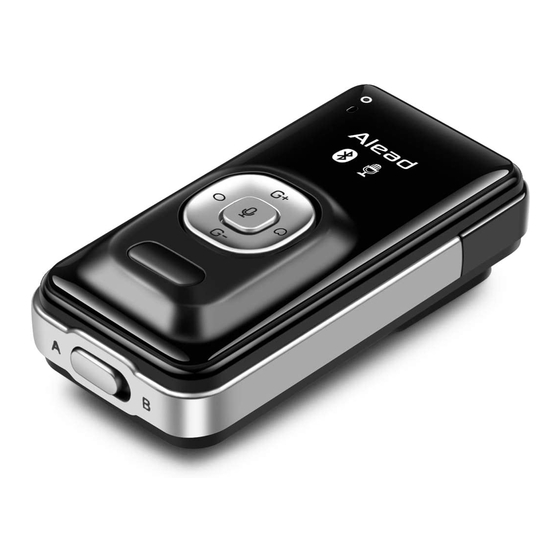Alead LiveMIC2 Manuel de l'utilisateur - Page 7
Parcourez en ligne ou téléchargez le pdf Manuel de l'utilisateur pour {nom_de_la_catégorie} Alead LiveMIC2. Alead LiveMIC2 11 pages. Wireless bluetooth microphone & transmitter. for the speech recognition user

Talking with external mic
connected
Talking with external mic
unplugged
Indication when external mic is not the chosen mic with LiveMIC2:
Talking with external mic
connected
Talking with external mic
disconnected
Using the LiveMIC2 with Speech Recognition Software
Bluetooth and Speech Recognition: General Considerations
Frequency Range: Although earlier versions of Bluetooth used a narrow band
audio signal and did not necessarily provide the best possible results with the
demanding needs of speech recognition software, newer devices, including the
LiveMIC2, use wide-band Bluetooth and will transmit the full range of human
speech frequencies. Most human speech occurs in the range of 300 Hz to 3.4
KHz and the frequency range of the LiveMIC2 (20Hz – 50KHz) more than covers
this.
Audio Latency: Another consideration is the lag time which occurs in the process
of digitizing and transmitting a sound, a process termed audio latency. In the
realm of Bluetooth, audio latency depends upon to factors: 1) the data format
and 2) the Bluetooth codec. Long latency periods are most critical in the context of a combined audio
and video scenario. If the sound is transmitted via Bluetooth and video seen in real-time, the lack of
synchronization will be apparent and impair the experience. There are two reasons that latency is NOT
an issue with the LiveMIC2, particularly when used with speech recognition software:
1. The LiveMIC2 employs the latest low latency Bluetooth technology
2. Unless extremely long, the latency is relatively meaningless to a speech recognition user since it
is a one-directional audio-only signal and, after all, what does it matter if there is a 40 vs. 100
nsec delay?
